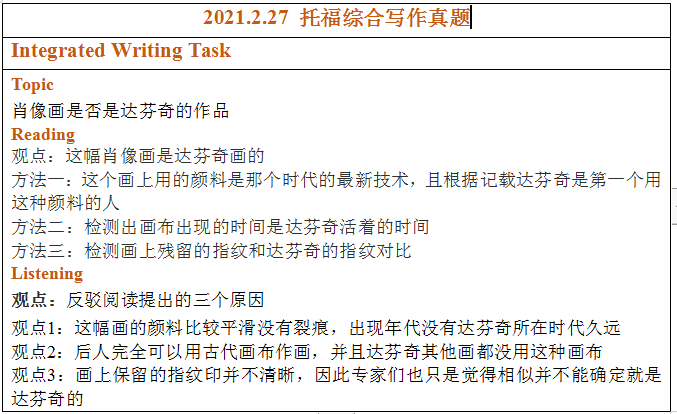

此次考察的话题属于托福综合写作考试中考频相对中等的历史类大话题的历史人物谜团的子话题。在TPO中有大量材料也涉及到了考古类相关话题,包括:TPO3, TPO8, TPO12,TPO28,TPO35。尤其是TPO3的材料内容和这次考到的话题有极大的相似性,都是涉及到了艺术作品的作者的讨论。因此,TPO同样仍旧是考生备战综合写作,熟悉话题的重要资料。
Keywords: mystery, biography, character, controversy, doubt.
可以类比下列这些TPO的综合写作。
TPO3 A painting not being the work of Rembrandt
阅读部分:
总观点:An Elderly in A white Bonnet 不是Rembrandt的作品
• 妇女的衣着和帽子不匹配;
• 光和影不搭配;
• 画在一个粘在一起的木板上。
听力反驳:
总论点:确实是R的作品
• 画上的毛领是后加的,原来的衣领和帽子匹配;
• 去掉毛领后,光影相互搭配;
• 加毛领的时候增加了木板。
TPO28 Whether Peary had reached the North Pole
阅读部分:
总观点:Peary确实到达了North Pole。
• NGS调查了Peary的设备和记录确认了他确实到达了North Pole;
• 一个近期的探险队证实了Peary确实可以在37天内从Ellesmere到达North Pole;
• 有照片能证明他到达了North Pole。
听力反驳:
• 总论点:这些证据并不具有说服力
• NGS不客观,committee主要由Peary的好朋友组成,另外他们也只调查了三天;
• Tom Avery的探险和Peary并不完全相同,不能以此为依据;
• 照片不够清晰,其中的阴影已经很模糊,不能用来计算太远的位置来证明照片确实是在南极拍摄。

题目解析:
可参考如下范文:
Every individual has his or her distinctive attributes, including the strengths and drawbacks, accomplishments and failure, which all serve as contributing factors for his or her success. Some argue that only if we inform others of one’s achievements and strengths, can we succeed in lives, while I totally agree with this statement. My viewpoint will be illustrated in the following paragraphs.
First, in daily situation, informing others about our advantages and previous achievements contributes to our success in social life. In other words, “showing off” to others about our competence will help us win more favors, because people generally admire those who can achieve what they are not capable of. For example, one may think highly of the person who can be fluent in translating Chinese into English if he or she is not proficient in either languages. The admiration will become the catalyst for the new relationship. Therefore, people who dare to present their advantage and success to others are in possession of rich social resources.
Second, it is important to our success in career that our colleagues or superiors know about what our expertise is. Right from the moment when a candidate walks into an interview, presenting his competence would be as significant as introducing their major and credential. Given that those interviewee generally know little about each of the candidates, they would certainly reach out for those who have left a deeper impression on them with their strength and success. After being admitted, cooperation commonly occurs in our work, and if our teammates know about our competence, it is more likely that we are assigned the tasks better presenting our value. For example, if one is good at communicating with other, and his teammates know about it, he will be allocated the task of negotiating with the business partner, instead of being asked to do statistic analysis. Thus, showing off spells for winning the chances that are not only precious but also right.
Admittedly, some may argue that showing off achievement and strength may bring about envy from others, which may become the obstacle for lives. However, the envy may not always turn into problem. Instead, it can become the stepping stone to encourage both to move further: for the one who shows off, he needs to keep striving for better in order not to be laughed at by others; for the one who envy others, the emotion can serve as the extrinsic motivation to push him to catch up with others.
As has been presented above, it is indispensable for one’s success in life to let others know his or her advantages and achievements.